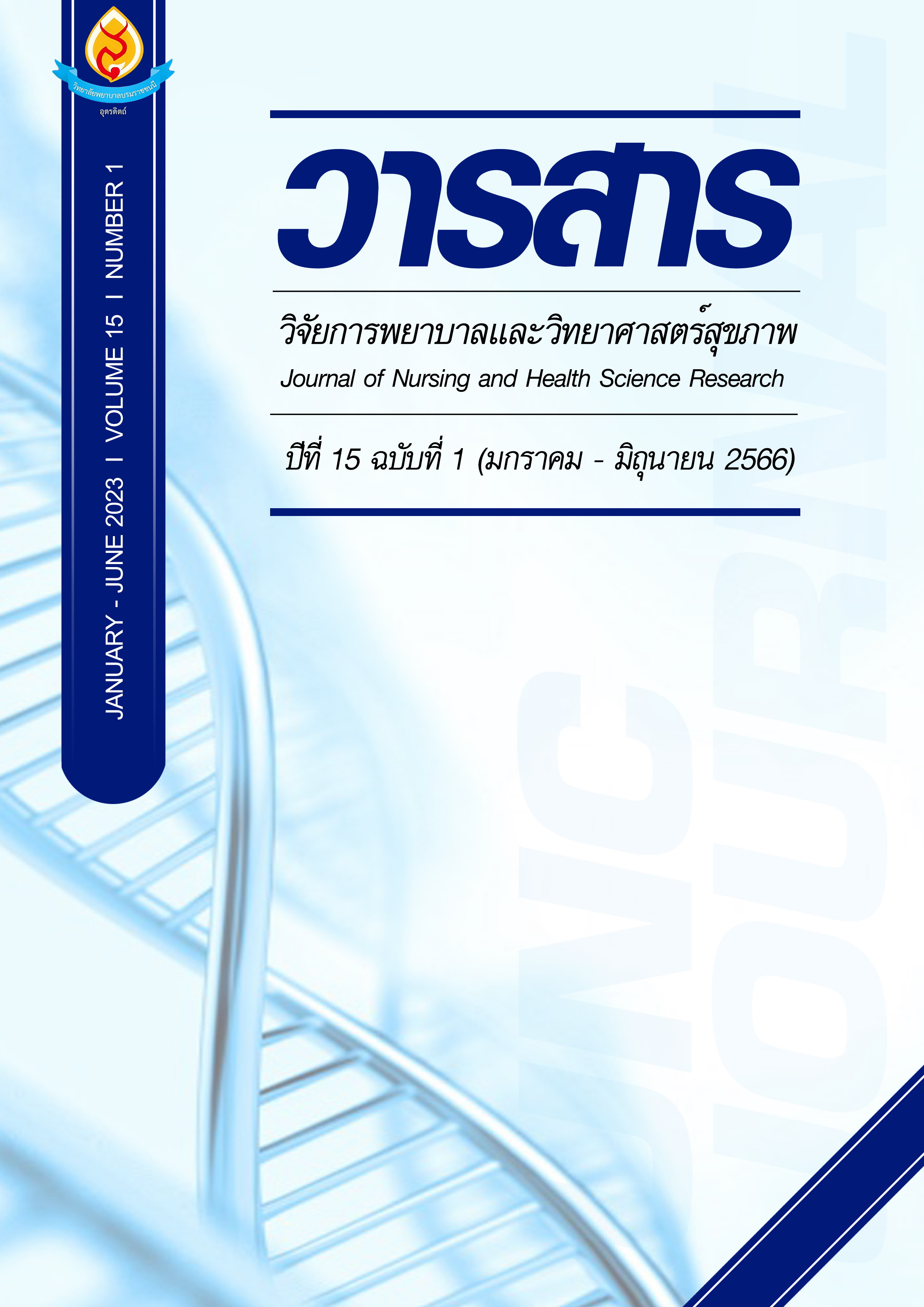ผลของโปรแกรมปรับเปลี่ยนพฤติกรรมการรับประทานอาหารและกิจกรรมทางกาย ต่อพฤติกรรมการป้องกันเบาหวานในผู้ใหญ่ที่มีภาวะโภชนาการเกิน
Main Article Content
บทคัดย่อ
การวิจัยครั้งนี้เป็นการวิจัยกึ่งทดลอง (quasi-experimental research) เพื่อศึกษาประสิทธิผลของโปรแกรมปรับเปลี่ยนพฤติกรรมการรับประทานอาหารและกิจกรรมทางกายต่อพฤติกรรมการป้องกันเบาหวานในผู้หญิงวัยผู้ใหญ่ที่มีภาวะโภชนาการเกิน กลุ่มตัวอย่างคือผู้หญิงอายุระหว่าง 35- 59 ปี และมีดัชนีมวลกายมากกว่า 23 กก/ม2 ที่อาศัยอยู่ในเขตรับผิดชอบของหน่วยบริการปฐมภูมิของโรงพยาบาลส่งเสริมสุขภาพ ตำบลบางขวัญและโรงพยาบาลส่งเสริมสุขภาพตำบลบางเตย อ.เมืองฉะเชิงเทรา จ.ฉะเชิงเทรา จำนวน 80 คน แบ่งเป็นกลุ่มทดลอง 40 คน และกลุ่มควบคุม 40 คน เครื่องมือในการวิจัยคือ 1) โปรแกรมปรับเปลี่ยนพฤติกรรมการรับประทานอาหารและกิจกรรมทางกาย 2) แบบสอบถามการรับรู้แบบแผนความเชื่อด้านสุขภาพ 3) แบบสอบถามแรงสนับสนุนทางสังคม 4) แบบสอบถามพฤติกรรมการป้องกันโรคเบาหวาน โดยมี ค่าสัมประสิทธิ์อัลฟาครอนบาคของแบบสอบถามทั้ง 3 ฉบับเท่ากับ .86, .84 และ .78 ตามลำดับ วิเคราะห์ข้อมูลโดยใช้สถิติบรรยายและสถิติทดสอบ Paired t-test, Independent t-test
ผลการวิจัยพบว่าภายหลังได้รับโปรแกรมปรับเปลี่ยนพฤติกรรมกลุ่มทดลองมีคะแนนเฉลี่ยการรับรู้ความเชื่อด้านสุขภาพ (t= 9.73, p <.001) แรงสนับสนุนทางสังคม (t=4.34, p<.001) และพฤติกรรมการป้องกันโรคเบาหวานโดยรวม (t=-4.22, p <.001) สูงกว่าก่อนทดลองและสูงกว่ากลุ่มควบคุมอย่างมีนัยสำคัญทางสถิติที่ระดับ .001 แสดงให้เห็นถึงประสิทธิภาพของโปรแกรมปรับเปลี่ยนพฤติกรรมการรับประทานอาหารและกิจกรรมทางกายมีผลต่อพฤติกรรมการป้องกันเบาหวานในผู้ใหญ่ที่มีภาวะโภชนาการเกิน
Article Details

อนุญาตภายใต้เงื่อนไข Creative Commons Attribution-NonCommercial-NoDerivatives 4.0 International License.
บทความหรือข้อคิดเห็นใดใดที่ปรากฏในวารสารวิจัยการพยาบาลและวิทยาศาสตร์สุขภาพ เป็นวรรณกรรมของผู้เขียน ซึ่งบรรณาธิการหรือสมาคมศิษย์เก่า ไม่จำเป็นต้องเห็นด้วย และบทความที่ได้รับการตีพิมพ์เผยแพร่ถือเป็นลิขสิทธิ์ของวารสารวิจัยการพยาบาลและวิทยาศาสตร์สุขภาพ
เอกสารอ้างอิง
Aekplakorn, W., Puckcharern, H. & Satheannoppakao, W. (2021). National health examination survey in Thailand 6 th B.C. 2562-2563. Bangkok: Health Systems Research Institute (HSRI). (in Thai).
Becker, M. H. & Maiman, L. A. (1974). The health belief model:original and correlates in phychological theory. Health Education monograph, 2(4), 336-353.
Cennoy, N. (1999). The effectiveness of a health education program on dietary control and exercise behavior modification among diabetic patients, Hankha Hospital Chainat Province. (Master’s thesis). Mahidol University. (in Thai).
Homchui, P., Wanaratvijid, C. & Pratoomsoot, C. (2020). Effect of self-management support for self-care behavior and blood glucose level in patients with type 2 diabetes mellitus. Boromarajonani College of Nursing, Uttaradit Journal, 12(1), 240-254. (in Thai).
House, J. S. (1981). Work stress and social support. New Jersey: Prentice Hall.
International Diabetes Federation. (2017). IDF diabetes atlas, 7th (2015). Brussels, Belgium: International Diabetes Federation.
International Diabetes Federation. (2021). IDF diabetes atlas, 10 th (2021). Brussels, Belgium: International Diabetes Federation.
Jiamjarasrangsi, W. (2017). Type 2 diabetes : epidemiology, prevention, and self-mangement support. Bangkok: Text and journal publication company limited. (in Thai).
Phungdee, T., Sirisopon, N., Kainakha, P., Nititham, A. & Chaleoykitti, S. (2017). The effectiveness of exercise behaviors promotion program of diabetes mellitus type 2 patients. Journal of The Royal Thai Army Nurses, 18(Supplement), 291-298. (in Thai).
Sirisuwan, P. (2018). Effects of health promotion programs for prevention new case of diabetes mellitus in a diabetes risk group in Singkok Sub-District, Kasetwisai District, RoiEt Province. Journal of Boromarajonani College of Nursing, Surin, 8(1), 45–58. (in Thai).
Srisatidnarakul, B. (2004). The methodology in nursing research. (3 rd ed.). Bangkok: U & I intermedia Co., Ltd. (in Thai).
Thianwan, Y., Nirattharadorn, M. & Wattana, C. (2012). The effects of a self-care promotion program on self-care behaviors and blood sugar levels among people at risk of diabetes. Nursing Journal, 39(2), 133-143. (in Thai).
Thumpenjit, S. (1998). The application of self-efficacy theory and health belief model to modify non-insulin dependent diabetes mellitus patients behaviors at Sakolnakorn Hospital in Sakolnakorn. (Master’s thesis). Mahidol University. (in Thai).
Winvat, S. (2008). Association of health belief perception and diabetic preventive behaviors in first degree relatives of patients with DM type 2. (Master’s thesis). Mahidol University. (in Thai).
World Health Organization. (2016). Global report on diabetes. Retrieved (2018, March 2). from http://apps.who.int/iris/ bitstream/10665/204871/1/978


